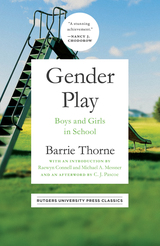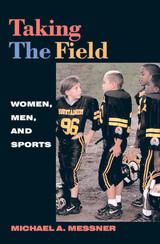5 books about Messner, Michael A.

Child's Play
Sport in Kids' Worlds
Messner, Michael A
Rutgers University Press, 2016
Is sport good for kids? When answering this question, both critics and advocates of youth sports tend to fixate on matters of health, whether condemning contact sports for their concussion risk or prescribing athletics as a cure for the childhood obesity epidemic. Child’s Play presents a more nuanced examination of the issue, considering not only the physical impacts of youth athletics, but its psychological and social ramifications as well.
The eleven original scholarly essays in this collection provide a probing look into how sports—in community athletic leagues, in schools, and even on television—play a major role in how young people view themselves, shape their identities, and imagine their place in society. Rather than focusing exclusively on self-proclaimed jocks, the book considers how the culture of sports affects a wide variety of children and young people, including those who opt out of athletics. Not only does Child’s Play examine disparities across lines of race, class, and gender, it also offers detailed examinations of how various minority populations, from transgender youth to Muslim immigrant girls, have participated in youth sports.
Taken together, these essays offer a wide range of approaches to understanding the sociology of youth sports, including data-driven analyses that examine national trends, as well as ethnographic research that gives a voice to individual kids. Child’s Play thus presents a comprehensive and compelling analysis of how, for better and for worse, the culture of sports is integral to the development of young people—and with them, the future of our society.
[more]

Gender Play
Boys and Girls in School
Barrie Thorne
Rutgers University Press, 2024
When it first appeared in 1993, Barrie Thorne’s Gender Play: Girls and Boys in School became an instant classic in the budding fields of feminist sociology and childhood studies. Through detailed first-hand observations of fourth and fifth graders at play, she investigated questions like: Why do girls and boys tend to self-segregate in the schoolyard? What can playful teasing and ritualized games like “cooties” and “chase and kiss” teach us about how children perform gendered identities? And how do children articulate their own conceptions of gender, distinct from those proscribed by the adult world?
A detailed and perceptive ethnography told with compassion and humor, Gender Play immerses readers in the everyday lives of a group of working-class children to examine the social interactions that shape their gender identities. This new Rutgers Classic edition of Gender Play contains an introduction from leading sociologists of gender Michael A. Messner and Raewyn Connell that places Thorne’s innovative research in historical context. It also includes a new afterword by one of Thorne’s own students, acclaimed sociologist C.J. Pascoe, reflecting on both the lasting influence of Thorne’s work and the ways that American children’s understandings of gender have shifted in the past thirty years.
A detailed and perceptive ethnography told with compassion and humor, Gender Play immerses readers in the everyday lives of a group of working-class children to examine the social interactions that shape their gender identities. This new Rutgers Classic edition of Gender Play contains an introduction from leading sociologists of gender Michael A. Messner and Raewyn Connell that places Thorne’s innovative research in historical context. It also includes a new afterword by one of Thorne’s own students, acclaimed sociologist C.J. Pascoe, reflecting on both the lasting influence of Thorne’s work and the ways that American children’s understandings of gender have shifted in the past thirty years.
[more]

Guys Like Me
Five Wars, Five Veterans for Peace
Messner, Michael A
Rutgers University Press, 2019
Over the last few decades, as the United States has become embroiled in foreign war after foreign war, some of the most vocal activists for peace have been veterans. These veterans for peace come from all different races, classes, regions, and generations. What common motivations unite them and fuel their activism?
Guys Like Me introduces us to five ordinary men who have done extraordinary work as peace activists: World War II veteran Ernie Sanchez, Korean War veteran Woody Powell, Vietnam veteran Gregory Ross, Gulf War veteran Daniel Craig, and Operation Iraqi Freedom veteran Jonathan Hutto. Acclaimed sociologist Michael Messner offers rich profiles of each man, recounting what led him to join the armed forces, what he experienced when fighting overseas, and the guilt and trauma he experienced upon returning home. He reveals how the pain and horror of the battlefront motivated these onetime warriors to reconcile with former enemies, get involved as political activists, and help younger generations of soldiers.
Guys Like Me is an inspiring multigenerational saga of men who were physically or psychically wounded by war, but are committed to healing themselves and others, forging a path to justice, and replacing endless war with lasting peace
Guys Like Me introduces us to five ordinary men who have done extraordinary work as peace activists: World War II veteran Ernie Sanchez, Korean War veteran Woody Powell, Vietnam veteran Gregory Ross, Gulf War veteran Daniel Craig, and Operation Iraqi Freedom veteran Jonathan Hutto. Acclaimed sociologist Michael Messner offers rich profiles of each man, recounting what led him to join the armed forces, what he experienced when fighting overseas, and the guilt and trauma he experienced upon returning home. He reveals how the pain and horror of the battlefront motivated these onetime warriors to reconcile with former enemies, get involved as political activists, and help younger generations of soldiers.
Guys Like Me is an inspiring multigenerational saga of men who were physically or psychically wounded by war, but are committed to healing themselves and others, forging a path to justice, and replacing endless war with lasting peace
[more]

No Slam Dunk
Gender, Sport and the Unevenness of Social Change
Cooky, Cheryl
Rutgers University Press, 2018
In just a few decades, sport has undergone a radical gender transformation. However, Cheryl Cooky and Michael A. Messner suggest that the progress toward gender equity in sports is far from complete. The continuing barriers to full and equal participation for young people, the far lower pay for most elite-level women athletes, and the continuing dearth of fair and equal media coverage all underline how much still has yet to change before we see gender equality in sports.
The chapters in No Slam Dunk show that is this not simply a story of an “unfinished revolution.” Rather, they contend, it is simplistic optimism to assume that we are currently nearing the conclusion of a story of linear progress that ends with a certain future of equality and justice. This book provides important theoretical and empirical insights into the contemporary world of sports to help explain the unevenness of social change and how, despite significant progress, gender equality in sports has been “No Slam Dunk.”
The chapters in No Slam Dunk show that is this not simply a story of an “unfinished revolution.” Rather, they contend, it is simplistic optimism to assume that we are currently nearing the conclusion of a story of linear progress that ends with a certain future of equality and justice. This book provides important theoretical and empirical insights into the contemporary world of sports to help explain the unevenness of social change and how, despite significant progress, gender equality in sports has been “No Slam Dunk.”
[more]

Taking The Field
Women, Men, and Sports
Michael A. Messner
University of Minnesota Press, 2002
In the past, when sport simply excluded girls, the equation of males with active athletic power and of females with weakness and passivity seemed to come easily, almost naturally. Now, however, with girls’ and women’s dramatic movement into sport, the process of exclusion has become a bit subtler, a bit more complicated-and yet, as Michael Messner shows us in this provocative book, no less effective. In Taking the Field, Messner argues that despite profound changes, the world of sport largely retains and continues its longtime conservative role in gender relations.
To explore the current paradoxes of gender in sport, Messner identifies and investigates three levels at which the "center" of sport is constructed: the day-to-day practices of sport participants, the structured rules and hierarchies of sport institutions, and the dominant symbols and belief systems transmitted by the major sports media. Using these insights, he analyzes a moment of gender construction in the lives of four- and five-year-old children at a soccer opening ceremony, the way men’s violence is expressed through sport, the interplay of financial interests and dominant men’s investment in maintaining the status quo in the face of recent challenges, and the cultural imagery at the core of sport, particularly televised sports. Through these examinations Messner lays bare the practices and ideas that buttress-as well as those that seek to disrupt-the masculine center of sport.
Taking the Field exposes the subtle and not-so-subtle ways in which men and women collectively construct gender through their interactions-interactions contextualized in the institutions and symbols of sport.
[more]
READERS
Browse our collection.
PUBLISHERS
See BiblioVault's publisher services.
STUDENT SERVICES
Files for college accessibility offices.
UChicago Accessibility Resources
home | accessibility | search | about | contact us
BiblioVault ® 2001 - 2024
The University of Chicago Press









